Advancing the Use of Inclusive Instructional Leadership Practices Across the P20 Continuum: School District, Higher Education, & State Perspectives
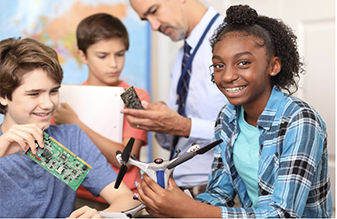
In the Johnstown-Monroe Local School District, Superintendent Philip Wagner pays constant attention to the need to bring adults at all levels of the system together around the district's mission to ensure the success of every student in every classroom in every school. "Our mission is straightforward; it's basically where student success is everything. We focus on the teaching and learning process," explained Dr. Wagner, a former school psychologist and director of student services.
Located in Licking County about 30 miles northeast of Columbus, Johnstown-Monroe defines student success this way: by never giving up and never giving in, every learner realizes individual excellence socially, emotionally, and academically.
Before taking the helm at Johnstown-Monroe, Wagner served for 11 years as superintendent of the Licking Heights Local School District, a neighboring district that currently serves over 5,000 students across six schools. That district had experienced rapid growth in student population during Wagner’s tenure – an experience that prepared him well for helping Johnstown-Monroe deal with similar changes. In fact, the district recruited Wagner to serve as Johnstown-Monroe's superintendent in anticipation of the transformative effect the new Intel plant is likely to have on the district. "I feel prepared for this new position, especially after what we accomplished at Licking Heights - fast growth, a lot of dynamic changes, a lot of successes, and a lot of celebration of those successes." Currently, Johnstown-Monroe serves about 1,700 students across four schools; but rapid growth in student population is anticipated.
An Eye Toward Coherence

The University of Cincinnati Systems Development & Improvement Center (UC SDI), with support from the Ohio Department of Education (ODE), has a long history of supporting districts in Ohio to improve their use of inclusive instructional leadership (IIL) practices for the purpose of improving adult collective learning and learning opportunities and outcomes for all students. IIL initiatives strive to increase coherence in the use of evidence-based improvement strategies across entire school systems in order to benefit all children, regardless of school or classroom assignment.
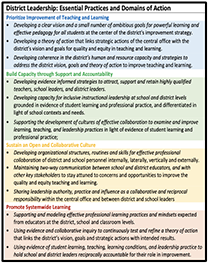
IIL practices can be described as actions to mobilize a school district, or schools within the district, to provide equitable opportunities to learn for each student while promoting high levels of learning for all students and each subgroup of students. This approach combines instructional leadership with social-justice leadership through the use of four key strategies: (1) prioritizing the improvement of teaching and learning, (2) building capacity through support and accountability, (3) sustaining an open and collaborative culture, and (4) promoting systemwide learning. Specific actions associated with each of these key strategies (see sidebar) are made possible through the use of the Ohio Improvement Process (OIP) and its associated leadership team structures [i.e. district leadership team (DLT), building leadership team (BLT), and teacher-based teams (TBT)].
District Leadership: Essential Practices and Domains of Action (DOCX)
Among the IIL-related professional learning opportunities made available through the UC SDI Center is the Advancing Inclusive Principal Leadership (AIPL) initiative, now in its second year. AIPL-OH is part of a national AIPL initiative coordinated through the Council of Chief State School Officers (CCSSO) in collaboration with the national CEEDAR Center.
AIPL-OH supports vertical teams (that is, “incubator” teams) comprising central office and school-level personnel. These teams review and build on existing improvement strategies and the extent to which they're engaging all learners in strong core instruction.
Participating teams identify ways to strengthen student engagement using IIL practices, test the strategies in one school in the district selected to be the incubator site, and implement lessons learned in the test school in other schools in the district. Vertical teams include the incubator school's principal and one or more selected teachers, as well as central office personnel including the administrator with oversight of special education.
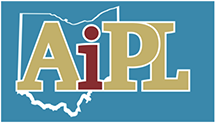
Membership is intentionally designed to cross organizational levels and roles in order to augment systemic district-wide continuous improvement efforts and focus on inclusive instructional leadership as a key function of the interlocking teams (DLTs, BLTs, TBTs) that form the foundation of the Ohio Improvement Process (OIP).
"What I focus on most is the alignment aspect of this work because its the most important factor. Part of our responsibility is to make sure we have scalable models, especially because we know we're going to grow and grow fast relatively soon. AIPL has been very well received," Wagner said.
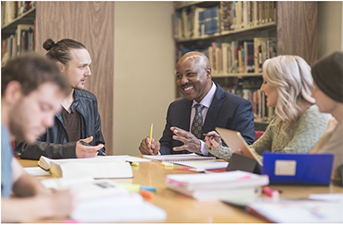
Building the capacity for shared leadership. Vertical teams from four districts, including Licking Heights, participated in the first year of OH-AIPL professional learning. This year, seven teams are participating, one from Johnstown-Monroe. Superintendent Wagner participated as a member of the Licking Heights team last year, and he’s part of Johnstown-Monroe's vertical team this year. "In both cases, we selected a middle school with the goal of creating a proof of concept model so that we can show on a smaller scale that we've achieved some success. And then, the idea is to grow it vertically in both directions so eventually we will cover the entire K-12 spectrum," Wagner said.
OH-AIPL PD involves monthly synchronous sessions from September through April with the option to pursue more in-depth learning during a second year of involvement. In addition to the synchronous sessions, the program also includes asynchronous learning, which provides an opportunity for in-district and cross-district conversation, access to resources, team time, reflection, and monthly in-district virtual process coaching with the team. The model used in AIPL, as in other IIL intiatives, promotes the development of shared leadership through the use of aligned collaborative leadership teams (i.e., DLT-BLT-TBT).
Districts selected for participation receive a $5,000 honorarium to offset costs associated with substitute teachers, district and school-level planning, and any in-district travel, if applicable.
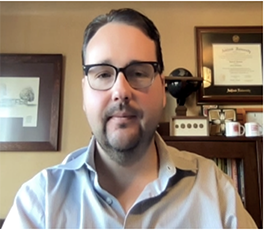
Dr. Rodney Harrelson, CEO of RTH Strategic Planning & Consulting, continues to coach the Licking Heights team, and also serves as a coach for Johnstown-Monroe. Coaching is provided through UC SDI at no cost to participating districts. "We typically think about schools in isolation; the idea with AIPL is to have alignment across the entire system. Being part of a new team configuration that feels purposeful - with teachers, principals, central office, and a superintendent or designee on the team - creates an opportunity to shift the hierarchy that comes with being in central office from what is traditionally a one-way dynamic to two-way, side-by-side learning," offered Harrelson.
Harrelson views Wagner as a superintendent with a "unique perspective." "He's engaged in a way that I don't often see and is thinking about the future and using these sorts of structures and programs to prepare his schools. He's very supportive and he's letting the team shape the work.

Promoting teacher voice. "One of the things that was very welcomed throughout the AIPL process last year was a focus on teacher voice and supporting teachers to be more invested in the process," Wagner explained. "We've had a longstanding history of flattening out the organization to try to get as many voices as possible to buy in so the level of acceptance and engagement is much greater. We're early in the process right now at Johnstown-Monroe but our expectation is to flatten out and expand the voices and really support a democratization of the process so we can get more engagement."
Wagner credits the coaching support provided through AIPL as particularly useful for encouraging the team to stay on track despite the many day-to-day challenges facing district and school personnel. As Wagner noted,
The greatest challenge when you're involved in this work is that it's a little bit theoretical and at times hard to stay with especially when normal school life kicks in. But, I will tell you, Dr. Harrelson, who's been our coach, has been tremendous. Staying on us and not being punitive and instead is directive to make sure we keep this work at the top of our list. His efforts have made the difference. I can point to a lot of daily operations that are important for a short time. However, we cannot lose focus and at the end of the day, AIPL is the important strategic work.

Harrelson agrees. "Things get in the way, and so you come back as a coach and you try to ground them in the work: 'Tell me where you are in this process; this is where you were before; let's get back on track; what are your next best steps based on where you want to go?' I think the coaching component is equal in importance to the learning sessions because it allows individual schools and educators to make sense and meaning of what's happening during that learning."
"The work vertical teams are engaged in is adaptive, not technical. Asking questions that help the team think differently is an important part of coaching," offered Harrelson. Adaptive leadership involves such actions as mobilizing groups to identify and address difficult challenges, and giving the work back to groups (Heifetz, Linsky, & Grashow, 2009).
Another important aspect of the AIPL vertical team process is its relationship to Ohio's improvement framework (i.e., the OIP), which is used to support districtwide improvement in teaching and learning through the use of "nested" leadership teams. Vertical teams are intended to be ad hoc teams for the purpose of testing a strategy at the school level with the goal of implementing that strategy across the system through established team structures (i.e., DLT-BLT-TBT).
Understanding how DLTs, BLTs, and TBTs work, and how they work together, to support both adult and student learning, is a critical element of the coaching process. Unlike one-on-one coaching that is provided as an essential component of OLi4, coaches assigned to vertical teams have to coach a team as well as district and school leadership personnel on how they're using the process to advance districtwide priorities. Harrelson explains:
One thing I love about this project is that it's both supporting the leaders, who are responsibile for implementing when we're not there, as well as the team and trying to balance who's facilitating the team process. Typically it is me but the goal has been to work with the principal or superintendent to say, 'okay, here are the pieces we need; we can co-facilitate. Then, I can help you plan it, you can facilitate it, and I can be there to support it.' So the work isn't being led by me; it's being led by the people who are in the district every day. Coaching is directed to the team, but it's also important to prepare individuals in formal leadership roles to be comfortable leading the change effort. We know that successful districts and schools have shared leadership across their entire organization. This project creates a safe facilitated space to try out some things and provides support, and permission, to do that in a contained space. There aren't many opportunities that allow people to come with an idea, incubate it, learn about it, try it out a little bit in year one and then go deep into that during year two and have support while you're doing it.
AIPL-OH vertical teams have the option of participating for a second year, which focuses on implementation of the strategies identified during year one. "As we advance the work, it is very much a part of our district leadership team, our building leadership team, and our teacher-based teams. Once you have our objective set, then that needs to be consistent throughout the organization and is very much a part of ourstrategic work moving forward," said Wagner.
Preparing Inclusive Leaders

Many education leadership preparation programs in Ohio are concerned with issues related to social justice and equity. In 2017, faculty at the University of Cincinnati's College of Education, Criminal Justice, Human Services, and Information Technology (CECH) began planning for the development of a doctoral-level program in educational leadership that would prepare more equity-oriented educational leaders and faculty.
According to Dr. Everrett A. Smith, Assistant Professor of Higher Education and Program Coordinator of Educational Leadership in the CECH School of Education, the resulting program offers two tracks—higher education and K12 leadership—both of which are offered online and have a considerable policy focus to complement the study of leadership, leading to an EdD.
"After doing deep programmatic work to make our master’s-level programs in K12 and higher education more equity-oriented, our faculty realized there was more to do. Perhaps, we reasoned, that work cannot all happen during initial licensure or early graduate study. This inspired us to revisit the notion of an online EdD for practitioners seeking to become transformative educational leaders and faculty," explained Smith. "We began recruiting our first cohort in early 2021 and officially welcomed them to the program in summer 2022!" he added.
Rationale for and focus of the program. The EdD program is designed for full-time working professionals and to help current leaders, policymakers, and administrators respond to the challenges facing our schools, universities, and educational organizations. Dr. Amy Farley, Associate Professor of Educational Leadership & Policy Studies, explains the rational for the program this way:
We need educational leaders that can responsively and creatively address both longstanding, persistent challenges—like vast inequities and unequal access and opportunity, rooted in oppressive systems and structures—and pressing “just-in-time” crises, like growing political unrest and divisiveness, budgetary and financial challenges, and the realities of teaching and learning during a global pandemic. We see this program as developing the kind of transformative leaders we need to face those challenges: Leaders who deeply understand the existing literature base and the theoretical underpinnings of practice and policymaking; leaders who are, in turn, able to collect new evidence and generate new knowledge to tackle problems of practice and policymaking and implementation; principled leaders who value what is right and also reimagine what is possible.

Currently the name of the program is Urban Educational Leadership but faculty plan to change the name to reflect the applicability and accessibility of the program to potential applicants on a statewide basis, rather than only to those who live and work in urban settings.
"We're looking for individuals who want to make a difference for their agencies, institutions, or communities who would benefit from a structured opportunity to learn and reflect on their practice," offered Smith. Many doctoral-level programs require full-time study and are designed for campus-based experiences. "While the most efficacious part-time students can often make these programs work for them, we saw a need for a program specifically designed for practitioners already making a difference in the field. Our program has been structured so that it intentionally meets student needs, scaffolds learning through a cohort course model, and provides full-time professionals the time to collaborate and build community together," he said.
The focus on working professionals extends to all aspects of the 36-month program. For example, completion of the dissertation will be structured through three consecutive course experiences, allowing candidates with busy lives and demanding jobs to organize their studies in a way that supports program and degree completion.
A second cohort of candidates is slated to begin the program in summer 2024 with applications accepted in late 2023.
Smith encourages individuals with an interest in the program to begin thinking about the next admission cycle. "It's not too early to rekindle a relationship with former faculty, supervisors, and colleagues willing to provide a letter of recommendation, and to begin work on a personal statement describing how the program will impact you on a personal level and contribute to student success. Consider applying!"
References
Heifetz, R. A., Linsky, M., & Grashow, A. The practice of adaptive leadership: Tools and tactics for changing your organization and the world. Harvard Business Press, 2009.
Intel to invest $20 billion in massive manufacturing hub in Ohio. (January 21, 2022). Electronic Design.
For More Information:
For more information about AIPL and how it's being used to support districtwide improvement efforts under way at Johnstown-Monroe Local School District, and/other IIL initiatives, contact: Philip H. Wagner, PhD, Superintendent, Johnstown-Monroe Local School District, at pwagner@jmk12.org.
For more information about AIPL and how to apply to participate during the 2023-2024 school year, contact: Becky Hornberger, PhD, Coordinator, Inclusive Instructional Leadership (IIL), University of Cincinnati Systems Development & Improvement Center (UC SDI), at Becky.hornberger@uc.edu or by phone at 614.270.4375.
For more information about UC's doctoral program in inclusive educational leadership, contact: Everrett A. Smith, PhD, Assistant Professor and Program Coordinator, at smith4e8@ucmail.uc.edu or by phone at 513.556.8028.
For more information about resources to support districts, contact OLAC Director Mike Trego, or OLAC Consultant Jim Gay, PhD or Karel Oxley.